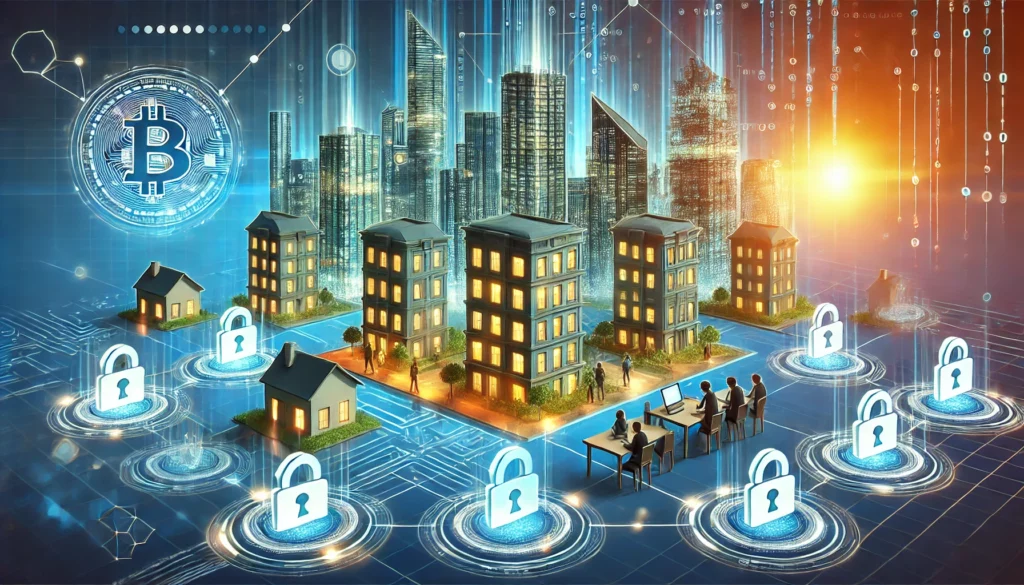Real estate has long been considered one of the most reliable investment opportunities, but traditional barriers like high entry costs, lack of liquidity, and complex transactions have made it inaccessible for many. Blockchain technology is now transforming the landscape through real estate tokenization, enabling fractional ownership and simplifying the investment process. By tokenizing properties, blockchain is democratizing property investment, allowing more people to participate in the market while creating a more transparent and efficient system.
This article explores how real estate tokenization works, its benefits, challenges, and its potential to revolutionize the property market.
What Is Real Estate Tokenization?
Real estate tokenization involves converting ownership of a physical property into digital tokens stored on a blockchain. Each token represents a fractional share of the property, allowing investors to buy, sell, and trade their stakes in a decentralized marketplace. These tokens can represent ownership rights, rental income, or even the property’s future value.
How It Works:
- Property Identification: A property is identified and valued.
- Token Creation: The property is divided into fractional shares represented by digital tokens.
- Blockchain Integration: The tokens are stored on a blockchain, ensuring transparency and immutability.
- Marketplace Listing: Tokens are listed on a digital platform where investors can purchase them.
For example, a $1 million property can be tokenized into 1 million tokens, each valued at $1. Investors can buy as many tokens as they wish, providing flexible entry points for varying budgets.
Benefits of Real Estate Tokenization
1. Lower Barriers to Entry
Traditional real estate investments often require significant capital. Tokenization allows investors to purchase fractions of a property, making it accessible to individuals with smaller budgets.
- Example: An investor with $100 can purchase tokens representing a fraction of a luxury property, a previously unattainable asset class.
2. Increased Liquidity
Real estate has traditionally been illiquid, with long transaction processes and limited resale options. Tokenized real estate can be traded on secondary markets, providing investors with liquidity similar to stocks.
3. Transparency and Security
Blockchain technology ensures that all transactions and ownership details are recorded on an immutable ledger, reducing fraud and increasing trust between buyers and sellers.
4. Global Accessibility
Tokenized real estate enables international investors to participate in property markets worldwide without the need for intermediaries or complex legal processes.
5. Diversification
Investors can diversify their portfolios by owning tokens in multiple properties across different locations and asset classes, reducing risk and increasing returns.
Real-World Examples of Real Estate Tokenization
1. St. Regis Aspen Resort
In 2018, a luxury hotel in Aspen, Colorado, tokenized $18 million worth of equity, allowing investors to purchase shares through digital tokens.
2. Emaar Properties
The Dubai-based real estate giant launched a blockchain-based token to enable customers and investors to participate in its projects globally.
3. Lofty AI
A U.S.-based platform offers tokenized shares in rental properties, allowing investors to earn rental income proportional to their holdings.
Challenges in Real Estate Tokenization
Despite its potential, real estate tokenization faces several challenges:
1. Regulatory Uncertainty
Different jurisdictions have varying regulations for tokenized assets, making it difficult to standardize practices globally.
- Example: Some countries classify tokens as securities, subjecting them to strict compliance requirements.
2. Adoption Barriers
While tokenization simplifies real estate transactions, the technology and concepts may be difficult for traditional investors to understand, slowing adoption.
3. Technology Limitations
Blockchain networks face scalability issues, which could hinder the smooth execution of high-volume transactions.
4. Legal and Ownership Disputes
Tokenizing a property requires clear legal frameworks to determine rights and responsibilities, which can be complex and vary by region.
5. Market Volatility
The value of tokens can fluctuate based on market demand, introducing volatility that may deter risk-averse investors.
The Role of Blockchain in Real Estate Tokenization
Blockchain is the backbone of real estate tokenization, offering several key advantages:
- Smart Contracts: Automate processes such as rental income distribution and token transfers, reducing administrative costs and errors.
- Immutable Records: Ensure ownership details are secure and tamper-proof.
- Decentralized Platforms: Allow peer-to-peer transactions, eliminating intermediaries and their associated fees.
The Future of Tokenized Real Estate
As blockchain technology matures, real estate tokenization is poised to grow significantly:
1. Enhanced Accessibility
More platforms are expected to emerge, catering to diverse investors and simplifying the tokenization process.
2. Integration with DeFi
Decentralized finance (DeFi) platforms may enable tokenized real estate to be used as collateral for loans or other financial instruments.
3. Institutional Adoption
Large financial institutions may tokenize their real estate portfolios, bringing credibility and liquidity to the market.
4. Cross-Border Investments
Tokenization will continue to reduce barriers for international investors, creating a truly global property market.
Conclusion
Real estate tokenization is revolutionizing property investment by leveraging blockchain to create a more accessible, transparent, and efficient market. By lowering entry barriers, increasing liquidity, and enhancing transparency, tokenization is democratizing real estate ownership and opening new opportunities for investors worldwide.
While challenges such as regulatory uncertainty and market volatility remain, the rapid pace of innovation suggests that tokenized real estate will become a cornerstone of the global property market. As blockchain technology continues to evolve, tokenization promises to make property investment more inclusive, dynamic, and future-ready.


